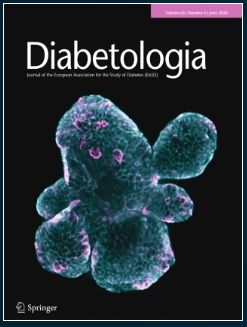DNA methylation of genes involved in lipid metabolism drives adiponectin levels and metabolic disease.
IF 10.2
1区 医学
Q1 ENDOCRINOLOGY & METABOLISM
引用次数: 0
Abstract
AIMS/HYPOTHESIS Despite playing critical roles in the pathophysiology of type 2 diabetes and other metabolic disorders, the molecular mechanisms underlying circulating adipokine levels remain poorly understood. By identifying genomic regions involved in the regulation of adipokine levels and adipokine-mediated disease risk, we can improve our understanding of type 2 diabetes pathogenesis and inter-individual differences in metabolic risk. METHODS We conducted an epigenome-wide meta-analysis of associations between serum adiponectin (n=2791) and leptin (n=3661) and leukocyte DNA methylation at over 400,000 CpG sites across five European cohorts. The resulting methylation signatures were followed up using functional genomics, integrative analyses and causal inference methods. RESULTS Our findings revealed robust associations with adiponectin at 73 CpGs and leptin at 211 CpGs. Many of the identified sites were also associated with risk factors for the metabolic syndrome and located in enhancers close to relevant transcription factor binding sites. Integrative analyses additionally linked 35 of the adiponectin-associated CpGs to the expression of 46 genes, and 100 of the leptin-associated CpGs to the expression of 151 genes, with implicated genes enriched for lipid transport (e.g. ABCG1), metabolism (e.g. CPT1A) and biosynthesis (e.g. DHCR24). Bidirectional two-sample Mendelian randomisation further identified two specific CpG sites as plausible drivers of both adiponectin levels and metabolic health: one annotated to ADIPOQ, the gene encoding adiponectin; and another linked to the expression of SREBF1, an established modifier of type 2 diabetes risk known to exert its effects via adiponectin. CONCLUSIONS/INTERPRETATION Taken together, these large-scale and integrative analyses uncovered links between adipokines and widespread, yet functionally specific, differences in regulation of genes with a central role in type 2 diabetes and its risk factors.参与脂质代谢的基因的DNA甲基化驱动脂联素水平和代谢疾病。
目的/假设尽管在2型糖尿病和其他代谢紊乱的病理生理中发挥着关键作用,但循环脂肪因子水平的分子机制仍然知之甚少。通过确定参与脂肪因子水平调控和脂肪因子介导的疾病风险的基因组区域,我们可以提高对2型糖尿病发病机制和代谢风险个体间差异的理解。方法:我们对5个欧洲队列中超过40万个CpG位点的血清脂联素(n=2791)和瘦素(n=3661)与白细胞DNA甲基化之间的关系进行了一项全表观基因组荟萃分析。使用功能基因组学、综合分析和因果推理方法对所得到的甲基化特征进行了随访。结果我们的研究结果显示,脂联素在73 CpGs和瘦素在211 CpGs有很强的相关性。许多已确定的位点也与代谢综合征的危险因素有关,并且位于靠近相关转录因子结合位点的增强子中。综合分析还将35个脂联素相关的CpGs与46个基因的表达联系起来,100个瘦素相关的CpGs与151个基因的表达联系起来,其中涉及的基因丰富于脂质转运(如ABCG1)、代谢(如CPT1A)和生物合成(如DHCR24)。双向双样本孟德尔随机化进一步确定了两个特定的CpG位点可能是脂联素水平和代谢健康的驱动因素:一个位点注释为ADIPOQ,编码脂联素的基因;另一个与SREBF1的表达有关,SREBF1是一种已知的2型糖尿病风险调节剂,通过脂联素发挥作用。综上所述,这些大规模的综合分析揭示了脂肪因子与在2型糖尿病及其危险因素中起核心作用的基因调控差异之间的联系。
本文章由计算机程序翻译,如有差异,请以英文原文为准。
求助全文
约1分钟内获得全文
求助全文
来源期刊

Diabetologia
医学-内分泌学与代谢
CiteScore
18.10
自引率
2.40%
发文量
193
审稿时长
1 months
期刊介绍:
Diabetologia, the authoritative journal dedicated to diabetes research, holds high visibility through society membership, libraries, and social media. As the official journal of the European Association for the Study of Diabetes, it is ranked in the top quartile of the 2019 JCR Impact Factors in the Endocrinology & Metabolism category. The journal boasts dedicated and expert editorial teams committed to supporting authors throughout the peer review process.
 求助内容:
求助内容: 应助结果提醒方式:
应助结果提醒方式:


